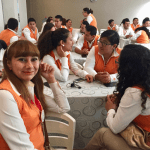Growth on Your Own Terms: Three Tips for Scaling Your Social Enterprise – Without Selling Your Soul to Investors
Leaders of international development organizations constantly face the challenge of needing more funding. Moreover, impact-driven entrepreneurs are always looking for ways to scale up their operations, to reach more people and improve more lives. Finding new donors and investors to fund this impact and expansion often comes with the cost of incorporating the opinions and vision of the investors into the enterprise’s business plan.
Finding Impact strives to help social entrepreneurs be more effective at what they do – and navigating the challenges of scaling has been a continuous focus of our work. By interviewing people with experience in different parts of the social enterprise space, we have gained a variety of insights on how to scale impact without selling out. We’ve compiled some key observations below.
Start small and build on your success
“Don’t bite off more than you can chew” is common advice for life and business – not to mention digestion – and it has obvious applications to social enterprise. Businesses should not try to work on more projects than their team can handle in a given day, nor should individual entrepreneurs assume too many of their organization’s positions. Although the benefits of starting small are clear in terms of an enterprise’s effectiveness (and its team’s sanity) when conducting its daily work, there are other advantages that only become apparent when the organization tries to scale.
Instead of trying to rapidly expand your enterprise into new geographies, maximize impact in the community where you currently work. You’ve already invested in learning how things work on the ground there, you’ve developed a delivery method, and you have a strong understanding of what you need to do to achieve success in this community. It is easier to spread until you hit saturation in one community than it is to operate at half capacity in multiple communities.
When Pollinate Energy began their social enterprise, they priced the cost of expanding into a new community into their business model. Associate Vice President Arjun Bolangdy told us that when you try to expand too rapidly, you are more likely to find yourself reliant on investors who want to impose their own agendas on your organization. Instead, Pollinate Energy decided to maximize its impact in the three communities where they were operating. They strived for a positive gross margin, so they could expand on their own terms and not sell out to investors with different priorities. Along with a unique non-profit/for-profit business model to help with small donor fundraising, Pollinate Energy followed a “bootstrap” method to expand by using money generated by its intra-city expansion. Now, as of this writing, Bolangdy’s organization has reached half a million people, and it continues to grow – but always on its own terms.
A key insight from Pollinate Energy’s approach is to achieve immediate success and pay back investors as soon as possible. Can you achieve profitability in your initial community of focus? Make that your first goal. Then, set aside revenue from your first community to expand into your second. Do the same for the third – and move forward from there.
Remember: Knowledge is power
Fundraising is an unavoidable dimension of social enterprise. Though entrepreneurs can’t control the need for funding, they can ensure that they enter into fundraising opportunities on terms that will help them achieve their desired outcome without selling out. The best way to maintain this control is by knowing everything there is to know about the work you do, the impact you have, the community where you work, and the market where you operate. The first step to gain this knowledge is to prioritize data collection through any means possible.
In our conversation with Tom Adams, Chief Impact Officer at Acumen, we talked about the value of investing in data collection early and exploring as many methods as possible. Data collection can come in many forms, too. Surveys of consumers help you understand where their needs are and where you are having an impact. Partnering with local officials to collect information on outcomes could be a cost-effective way to quantify your impact. Researching demographic information helps you identify untapped markets and understand the purchasing capacity of your consumers.
A wealth of this type of data can go a long way to help you scale your enterprise without compromising its impact. With this data in hand, social entrepreneurs can craft a narrative of their work and sell potential investors – not only on their organization or strategy but on their impact. As Adams points out, a strong dataset can help you demonstrate success to investors on your own terms. When an investor tries to exert control on your organization, data helps you make a convincing argument that your desired outcomes are the most important metrics for success. This point was driven home by our conversation with Arielle Molino of Intellecap. Molino noted that by grounding yourself in this data, especially when it comes to understanding consumers, social entrepreneurs can ensure they remain focused on providing impact and serving the people in the communities where they work.
Keep your business goals in mind
Although international development is first and foremost about driving impact, social entrepreneurs must remember they are still running a business. Many of the guests we’ve interviewed at Finding Impact drove home the point that the same keys to success apply to enterprises in the development space as they do to any other business. And when you are a successful business manager, you will have more capacity to scale without selling out.
As Elizabeth West of iGravity put it, you should focus on becoming “investor ready” by developing a coherent business model and a clear, strong vision for your business as the first step – even before you approach potential investors. Additionally, in a two–part conversation, Miora Randriambeloma of Chalkboard Education recommended you learn from your peers to get a better picture of the investment landscape. When you finally do get in front of a potential investor, be sure you have a good understanding of the investment model that works best for your business, whether that involves business plan competitions or venture capital. Randriambeloma also recommended not accepting money you don’t need, as that puts an unnecessary burden on your growth and brings more investor influence into your decision-making.
In our interview with Nina Gené of Jasmine Social Investments, she suggested a unique way to view your social enterprise: Don’t just think like an entrepreneur, think like a venture capitalist. Thinking like a venture capitalist means knowing how to value a company, assess a business model, negotiate a deal, pick a team, and complete comprehensive due diligence. All of these skills could help a development organization scale up, just as they help venture capitalists invest in start-ups. Moreover, Gené encouraged social entrepreneurs to avoid holding out for a perfect deal when a good deal with a good investor is available because being short on money is not a good negotiating position. Finally, she recommended that you maintain a strong line of communication with your current investors to keep them satisfied and keep you in control of your mission.
Though it can be challenging to deal with investor demands when scaling up, there is a silver lining for social entrepreneurs: The ranks of high-quality investors continue to grow. According to Miora Randriambeloma, more mature investors are getting involved. These are the investors who recognize the risk associated with impact, and who not only want you to succeed, but want you to succeed on your own terms. These are the type of investors who will continue to help you as you work toward your goal. And if all else fails, social entrepreneurs can always find more advice on how to scale up and run your organization and maximize your impact at findingimpact.com.
Author’s note: We’d like to thank everyone interviewed for our podcast, especially Arjun Bolangdy, Tom Adams, Arielle Morino, Elizabeth West, Miora Randriambeloma and Nina Gené, whose insights were featured in this article.
Sam Alhadeff is the lead writer for Finding Impact, a website and podcast dedicated to supporting social entrepreneurs in navigating international development.
Photo courtesy of Bernard Hermant.
- Categories
- Social Enterprise



